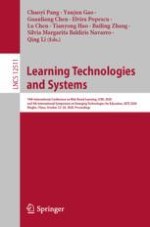2021 | OriginalPaper | Chapter
Corpus-Based Semantic Prosody Study of English-Chinese Translation: Taking Trump’s Popular Saying “It Is What It Is” as an Example
Authors : Tiantian Wang, Shili Ge
Published in: Learning Technologies and Systems
Publisher: Springer International Publishing
Activate our intelligent search to find suitable subject content or patents.
Select sections of text to find matching patents with Artificial Intelligence. powered by
Select sections of text to find additional relevant content using AI-assisted search. powered by
